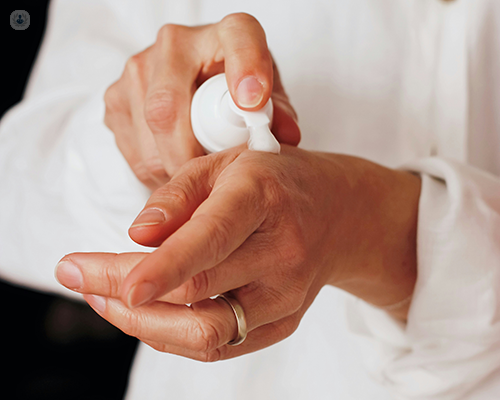Psoriasis: An expert guide to managing symptoms
Escrito por:
Psoriasis is a chronic autoimmune condition characterised by thick, red and scaly plaques on the body, scalp or genitals with a potential for changes in the nails and joint inflammation.
Here, Dr Bryan Murphy, renowned consultant dermatologist, provides an expert insight into psoriasis.

What are the causes of psoriasis?
Psoriasis is a chronic inflammatory skin condition that often develops in patients with a family history of the disorder. Triggers for psoriasis flare-ups among genetically predisposed patients include throat infections, illness, stress, and certain traumas like scar injuries or tattoos.
Are there different types of psoriasis?
The different types of psoriasis are categorised based on their appearance or location on the body.
Common types of psoriasis include:
- Guttate psoriasis: Characterised by smaller, generalised plaques. This type of psoriasis often follows throat infections.
- Chronic plaque psoriasis: Characterised by large plaques. This type of psoriasis commonly affects the scalp, genitals, and/or nails.
- Flexural psoriasis: Characterised by flatter, less scaly patches in skin-fold areas like the armpits, under the breasts, or groin creases.
- Pustular psoriasis: Characterised by widespread pinhead-sized white or yellow pus-filled spots on the background of a red rash.
- Palmoplantar psoriasis: Characterised by thickened, red, scaly patches. This type of psoriasis affects the hands and feet.
How is psoriasis treated? What treatment options are available?
I employ a step-by-step “treatment ladder" to address psoriasis, tailoring specific treatment plans according to the type and severity of each patient’s condition.
The sequence of treatments I normally use is as follows:
1. Emollients: All patients with psoriasis will benefit from using an emollient to moisturise their skin, soften any scale, relieve itching, and improve the absorption of active treatments.
2. Creams: Topical steroid creams, ointments, lotions, and foams provide anti-inflammatory effects for actively inflamed psoriasis. These treatments are safe when used according to the prescribed regimen.
3. Vitamin D and coal tar: Vitamin D and coal tar-based treatments are additional options to decrease plaque size and thickness, either during a flare-up (in combination with a topical steroid) or for maintenance therapy afterwards.
4. Phototherapy: Phototherapy, also known as ultraviolet light therapy, may be recommended if topical treatments are insufficient. It is important, however, to avoid sunbeds as they aren't a substitute for medically supervised phototherapy.
5. Oral medications and biologic injections: Oral treatments and biologic injections may be used for severe cases of psoriasis. These treatments, prescribed only by a dermatologist, require periodic blood monitoring. While they may have more potential side effects than topical agents, these treatments can achieve much better results for widespread or stubborn psoriasis and are also safe to use when supervised by a specialist.
Should patients with psoriasis be mindful of any lifestyle factors or environmental triggers?
In most patients, since psoriasis is largely determined by genetic predisposition, there are things one can do to try to keep flares controlled. My recommendation is to always adhere to prescribed treatments and maintain a healthy lifestyle and balanced diet. Holistically, this approach not only promotes good health and wellbeing but also helps reduce cardiovascular risks, as psoriasis itself is now recognised as an individual risk factor.
Additional key points to be aware of regarding psoriasis include:
- Alcohol intake: Excessive alcohol consumption can aggravate psoriasis severity and lead to a less effective response to treatment.
- ‘Koebnerisation’: Psoriasis often exhibits a phenomenon known as 'koebnerisation,' whereby plaques can develop at sites of injury such as tattoos, wounds, and surgical scars.
- Arthritis: Psoriasis increases the risk of developing a form of arthritis. Therefore, my recommendation is to always discuss any joint-related concerns with a specialist early on.
Can psoriasis affect mental health? What strategies can dermatologists employ when devising treatment plans to address this matter?
As with any new diagnosis, patients will need time to come to terms with their condition and the importance of integrating application of creams into their daily routines. While some patients will adjust more readily, others may find this period stressful or challenging. Furthermore, managing flaring psoriasis and using creams at home to try and control it can also lead to heightened worry, stress, and anxiety.
To support my patients, I make sure they understand their treatment plan and I also provide them with a printed copy of this or a photograph to retain as a reference following their consultation. Additionally, I often direct patients to some of the excellent free support groups and resources available, regardless of their stage in their psoriasis journey. Some notable examples of these include the 'Healthy Skin for All' hub by the British Association of Dermatologists, or The Psoriasis Association.
If you require expert treatment and management for psoriasis, schedule an appointment with Dr Bryan Murphy via his Top Doctors profile today.


